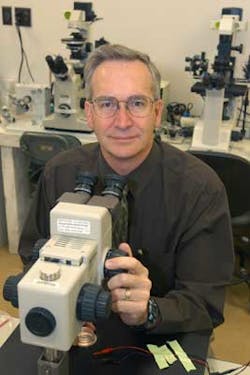University of Missouri scientists successfully transplant, grow stem cells in pigs
One of the biggest challenges for medical researchers studying the effectiveness of stem cell therapies is that transplants or grafts of cells are often rejected by the hosts. This rejection can render experiments useless, making research into potentially life-saving treatments a long and difficult process. Now, researchers at the University of Missouri have shown that a new line of genetically modified pigs will host transplanted cells without the risk of rejection.
ADDITIONAL READING |Using light to spark stem cells to regrow teeth
“The rejection of transplants and grafts by host bodies is a huge hurdle for medical researchers,” said R. Michael Roberts, Curators professor of animal science and biochemistry and a researcher in the Bond Life Sciences Center. “By establishing that these pigs will support transplants without the fear of rejection, we can move stem cell therapy research forward at a quicker pace.”


